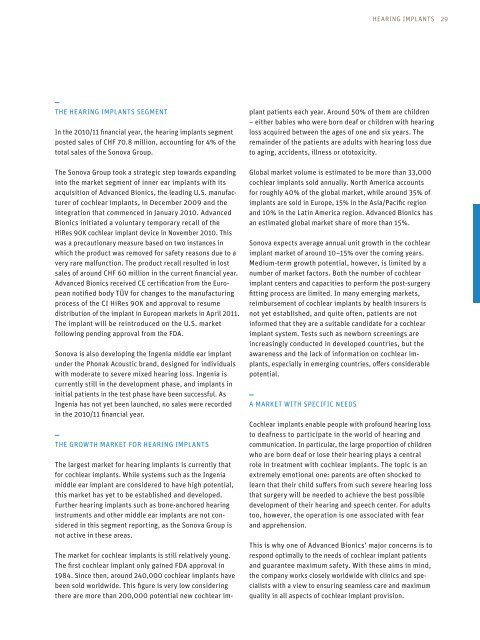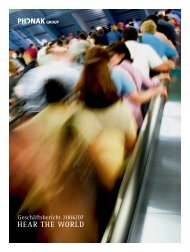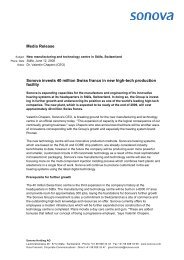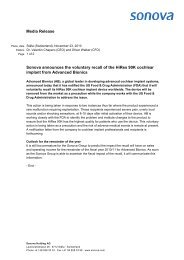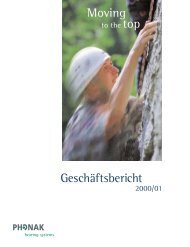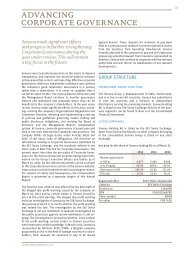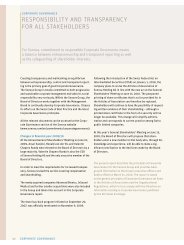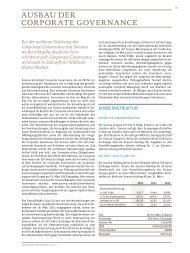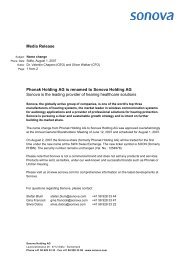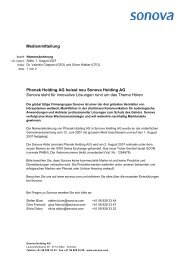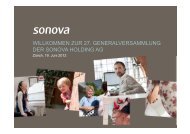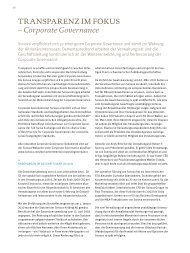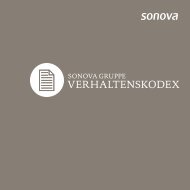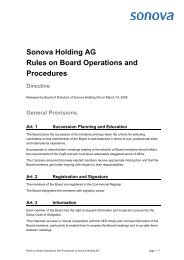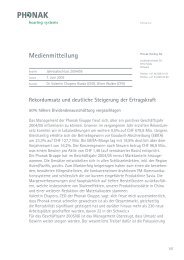Annual Report 2010/11 - Sonova
Annual Report 2010/11 - Sonova
Annual Report 2010/11 - Sonova
Create successful ePaper yourself
Turn your PDF publications into a flip-book with our unique Google optimized e-Paper software.
THE HEARING IMPLANTS SEGMENT<br />
In the <strong>2010</strong>/<strong>11</strong> financial year, the hearing implants segment<br />
posted sales of CHF 70.8 million, accounting for 4% of the<br />
total sales of the <strong>Sonova</strong> Group.<br />
The <strong>Sonova</strong> Group took a strategic step towards expanding<br />
into the market segment of inner ear implants with its<br />
acquisition of Advanced Bionics, the leading U.S. manufacturer<br />
of cochlear implants, in December 2009 and the<br />
integration that commenced in January <strong>2010</strong>. Advanced<br />
Bionics initiated a voluntary temporary recall of the<br />
HiRes 90K cochlear implant device in November <strong>2010</strong>. This<br />
was a precautionary measure based on two instances in<br />
which the product was removed for safety reasons due to a<br />
very rare malfunction. The product recall resulted in lost<br />
sales of around CHF 60 million in the current financial year.<br />
Advanced Bionics received CE certification from the European<br />
notified body TÜV for changes to the manufacturing<br />
process of the CI HiRes 90K and approval to resume<br />
distribution of the implant in European markets in April 20<strong>11</strong>.<br />
The implant will be reintroduced on the U.S. market<br />
following pending approval from the FDA.<br />
<strong>Sonova</strong> is also developing the Ingenia middle ear implant<br />
under the Phonak Acoustic brand, designed for individuals<br />
with moderate to severe mixed hearing loss. Ingenia is<br />
currently still in the development phase, and implants in<br />
initial patients in the test phase have been successful. As<br />
Ingenia has not yet been launched, no sales were recorded<br />
in the <strong>2010</strong>/<strong>11</strong> financial year.<br />
THE GROWTH MARKET FOR HEARING IMPLANTS<br />
The largest market for hearing implants is currently that<br />
for cochlear implants. While systems such as the Ingenia<br />
middle ear implant are considered to have high potential,<br />
this market has yet to be established and developed.<br />
Further hearing implants such as bone-anchored hearing<br />
instruments and other middle ear implants are not considered<br />
in this segment reporting, as the <strong>Sonova</strong> Group is<br />
not active in these areas.<br />
The market for cochlear implants is still relatively young.<br />
The first cochlear implant only gained FDA approval in<br />
1984. Since then, around 240,000 cochlear implants have<br />
been sold worldwide. This figure is very low considering<br />
there are more than 200,000 potential new cochlear im-<br />
HEARING IMPLANTS<br />
plant patients each year. Around 50% of them are children<br />
– either babies who were born deaf or children with hearing<br />
loss acquired between the ages of one and six years. The<br />
remainder of the patients are adults with hearing loss due<br />
to aging, accidents, illness or ototoxicity.<br />
Global market volume is estimated to be more than 33,000<br />
cochlear implants sold annually. North America accounts<br />
for roughly 40% of the global market, while around 35% of<br />
implants are sold in Europe, 15% in the Asia/Pacific region<br />
and 10% in the Latin America region. Advanced Bionics has<br />
an estimated global market share of more than 15%.<br />
<strong>Sonova</strong> expects average annual unit growth in the cochlear<br />
implant market of around 10–15% over the coming years.<br />
Medium-term growth potential, however, is limited by a<br />
number of market factors. Both the number of cochlear<br />
implant centers and capacities to perform the post-surgery<br />
fitting process are limited. In many emerging markets,<br />
reimbursement of cochlear implants by health insurers is<br />
not yet established, and quite often, patients are not<br />
informed that they are a suitable candidate for a cochlear<br />
implant system. Tests such as newborn screenings are<br />
increasingly conducted in developed countries, but the<br />
awareness and the lack of information on cochlear implants,<br />
especially in emerging countries, offers considerable<br />
potential.<br />
A MARKET WITH SPECIFIC NEEDS<br />
Cochlear implants enable people with profound hearing loss<br />
to deafness to participate in the world of hearing and<br />
communication. In particular, the large proportion of children<br />
who are born deaf or lose their hearing plays a central<br />
role in treatment with cochlear implants. The topic is an<br />
extremely emotional one: parents are often shocked to<br />
learn that their child suffers from such severe hearing loss<br />
that surgery will be needed to achieve the best possible<br />
development of their hearing and speech center. For adults<br />
too, however, the operation is one associated with fear<br />
and apprehension.<br />
This is why one of Advanced Bionics’ major concerns is to<br />
respond optimally to the needs of cochlear implant patients<br />
and guarantee maximum safety. With these aims in mind,<br />
the company works closely worldwide with clinics and specialists<br />
with a view to ensuring seamless care and maximum<br />
quality in all aspects of cochlear implant provision.<br />
29


